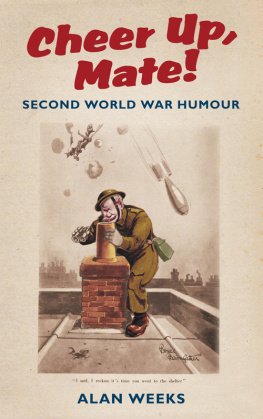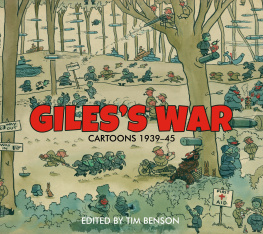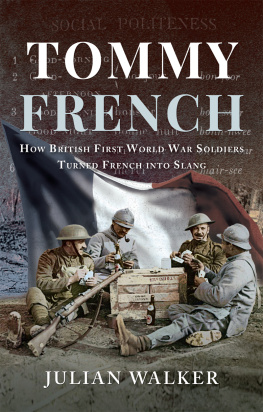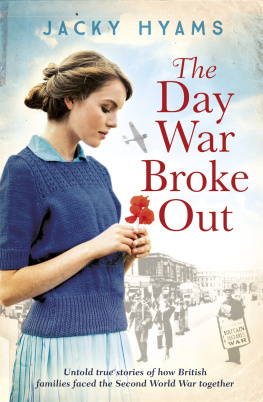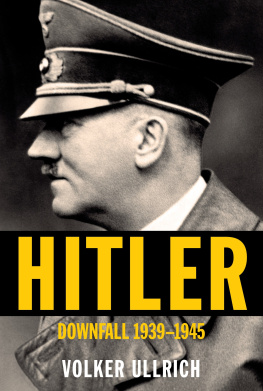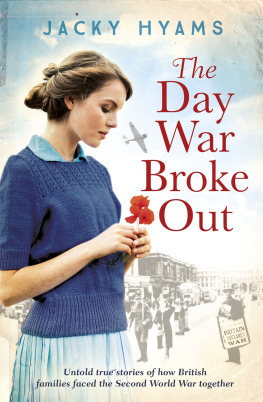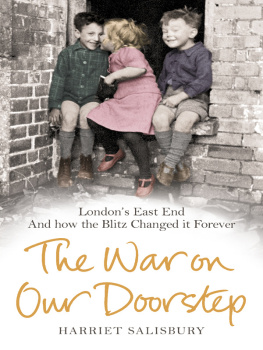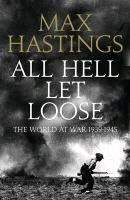Cheer Up,
Mate!
Cheer Up,
Mate!
SECOND WORLD WAR HUMOUR
ALAN WEEKS

Cover illustration: Old Bill and Co. by Bruce Bairnsfather. (Illustrated London
News Ltd/Mary Evans)
First published in 2011
The History Press
The Mill, Brimscombe Port
Stroud, Gloucestershire, GL5 2QG
www.thehistorypress.co.uk
This ebook edition first published in 2013
All rights reserved
Alan Weeks, 2011, 2013
The right of Alan Weeks to be identified as the Author of this work has been asserted in accordance with the Copyright, Designs and Patents Act 1988.
This ebook is copyright material and must not be copied, reproduced, transferred, distributed, leased, licensed or publicly performed or used in any way except as specifically permitted in writing by the publishers, as allowed under the terms and conditions under which it was purchased or as strictly permitted by applicable copyright law. Any unauthorised distribution or use of this text may be a direct infringement of the authors and publishers rights, and those responsible may be liable in law accordingly.
EPUB ISBN 978 0 7524 9688 7
Original typesetting by The History Press
Contents
ONE

The Bore War
Are they here?
The day war broke out my mother said to me, You can go out and play but dont be late because the German bombers might come.
Will they come down the 57 or the 56? I enquired. I was about three months short of my fifth birthday. The number 57 bus came south to Cubitt Town (Isle of Dogs, East London) from Poplar and the 56 went north from Cubitt Town to Mile End, Bow.
I dont know, she admitted.
She neednt have worried about the German bombers: they didnt arrive for a year, not in my neck of the woods, anyway. Millions of children and their mums had been shifted out of the cities (600,000 between Friday 1 September and Sunday 3 September, 1939 alone) when war was announced. A lot of them returned home before Christmas because nothing seemed to be happening. It was The Bore War, later The Phoney War (American terminology eventually won through here). Indeed, newspaper vendors got fed up with the lack of news and printed their own on the billboards:
Latest Germans in Berlin. Evening Paper Scots in Aberdeen.
Up the road from me in Romford a terrible storm was raging after the prime minister, Neville Chamberlain, had spoken to the nation, and little Alice Greer, who had heard that war was noisy, asked her mum, Are they here?
Just seven minutes after the prime minister announced war the first real air-raid siren began to wail (indicating that enemy bombers were twelve minutes away according to official instructions) and the police pedalled furiously up and down streets bearing placards which read TAKE COVER. It was a false alarm.
One lady in Birmingham sympathised with Mr Chamberlain having to declare war on the Sabbath, but at least this lady and Alice had some idea that conflict had started. Donald Wheals mum didnt tell him until the 7th. However, by then, he was probably wondering why they had all suddenly left home in Chelsea and gone to Woking.
Gas masks
The public had been warned about all sorts of gases lung irritant, tear gas, sneezing gas, blister gas and there were frequent panics caused by floor polish, mustard, musty hay, bleach powder, horseradish, geraniums, pear drops, etc.
Meanwhile, the BBC helpfully advised listeners not to try out their masks in turned-on gas ovens or by their car exhaust pipes. Small children had a Mickey Mouse mask and soon discovered that by blowing through the rubber vent they could produce a rude noise. Infants were completely enveloped in something resembling a tent. The tops of many pillar-boxes were painted yellow with gas detector paint: when gas was around they were supposed to change colour. Special masks were designed for animals: the one for shire horses weighed a kilo (or 2.2 pounds, as they called it in those days).
People became particularly worried about their pet dogs. Mrs Parmenter of Plaistow, who boarded dogs, received a lot of enquiries about kennelling dogs during air raids. Perhaps she was known to be bombproof.
After the first air-raid warning Odette Lesley and her family frantically tried to don their new masks. Her mothers ended up round the back of her head, her sisters suspended from her left ear and Odettes jammed inside her jumper.
However, a great deal of training went into the proper use of the masks. In fact, by 19 September Kay Phipps had been awarded her Chemical War Certificate, including the ability to respond correctly to the instructors vital question, What do you do on receiving the warning Gas Attack?.
In response, Kay and her fellow students, Miss Twitter and Miss Flaps, had learnt to chant: Attend to the wants of nature! At which point Miss Twitter and Miss Flaps collapsed into helpless giggles.
Even more assistance was forthcoming from newspapers, especially the advertisement for Sanotogen Nerve-Tonic Food, described as a national necessity for preserving good nerves in the current situation.
Evacuation
Operation Pied Piper moved nearly four million evacuees in 1939. The inhabitants of the village of Waltham St Lawrence in Berkshire were warned to expect hordes of these shadow trekkers. It could be hard going for evacuee and host. On a train from Birkenhead heads were examined and 10-year-old Doreen was interrogated: Is your brother a breeder?
Following due inspections there could be an ordeal by Dettol, grotesque bright pink or bright green disinfectants, or soft soap, paraffin or vinegar, plus a metal Derbac Comb (which hurt, I can tell you). Some nurses cut to the chase and sheared off whole heads of hair, such as Nitty Nora of Pulborough, Sussex. One host in Lancashire purchased a cake of sheep dip from the local chemist shop.
Evacuation could also be hazardous: tiny Syd Smith, on his way to Frome by train from Paddington with his little suitcase, containing a bar of Frys Chocolate, an apple, a Tin Can Tommy comic and spare shirts and braces, stuck his head out of a window and his prized cap flew off in the breeze. Syd screamed blue murder and demanded that the train be halted so that he could retrieve his beloved headgear.
Indeed, he became so excited that a Bulls Eyes boiled sweet (guaranteed to last half an hour) lodged securely between his teeth. As anxious adults shook him about a bit he caught his finger in a sliding door.
At the same time, there were also difficulties for well-meaning hosts. The dirt accumulated on the legs and neck of a small boy from Salford resisted several applications of very hot water and carbolic soap. After the operation was eventually successful he exclaimed cheerfully, Cor, I dont half feel funny!
At least they managed to get him into a bath: others adamantly refused to go in a tub through fear of drowning. Laying in a bed was considered inappropriate because back at some homes this happened only to corpses. Ignorance of country ways was also widespread: milk from cows was urine in the estimation of some children from the cities.
I was evacuated and went to Long Hanborough near Oxford with my sister, who was four years older than me (she was 9 at the time). It was a hard winter and I was eventually rescued by my family. Our hosts were a childless couple and really didnt know how to look after us. The wife thought it was her duty to totally protect the well-being of her husband. During the evenings we had to stay in an unheated kitchen whilst our hosts sat round a roaring fire in the living room. I got frostbite in my feet.
Next page
